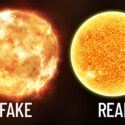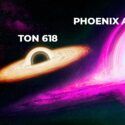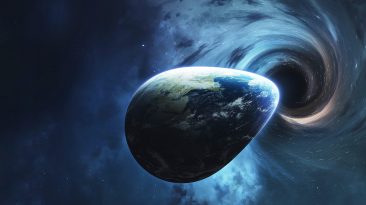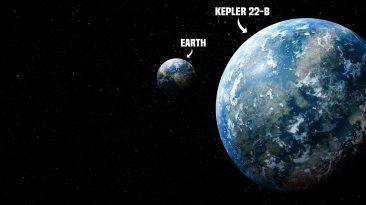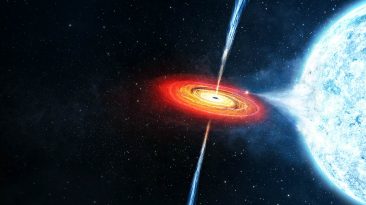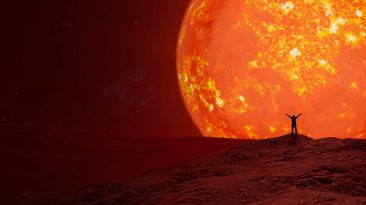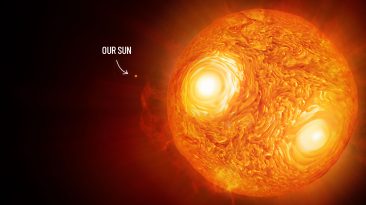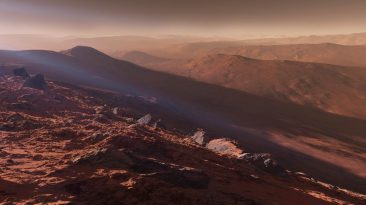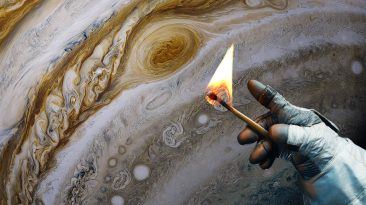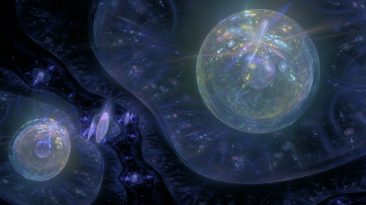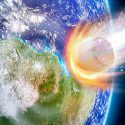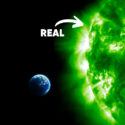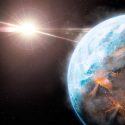Imagine you’re out for a walk on a lovely day, with not a care in the world. The birds are singing, and the sun is shining.
Actually, the sun seems brighter than usual. And come to think of it, your skin feels kind of “funny.”
It turns out that’s not the sun at all, but the radiation and gamma-ray filled light coming from a quasar! So, in short, you’re in serious trouble.
How did a quasar even get here? And what would happen to Earth if a quasar moved into our neighbourhood?
I hope you didn’t have any plans today, as the brightest object in the sky has set up shop in our Solar System. So what exactly is going on, anyways?
A quasar is the result of two black holes colliding to form a supermassive black hole, with a central mass that outweighs our Sun by a billion times. When black holes merge, everything goes out of whack.
The two black holes begin to consume all the gas and dust from each other, along with anything else in the area. Ok so, if they’re eating each other, why are we seeing that bright light? ? Well, the thrown off material begins to glow from pressure and friction, resulting in the blinding light you’re seeing.
If this were to happen in Earth’s vicinity, it would be a result of the black hole in the middle of the Milky Way galaxy smashing into the black hole at the middle of the Andromeda galaxy, which is 2.5 million light-years away. If these two met, we’d be looking at a massive amount of infrared light being expelled into the Universe.
Oh, and it’s also a harbinger of death and destruction, too. What would happen to our planet?
Well, brace yourself, because this is going to be a doozy. Quasars throw off jets of particles that are so bright that they outshine all the stars in their galaxies. So our Sun would essentially turn into a candle in the middle of a very bright spotlight.
The illumination from a quasar, along with all the radiation it throws off, would mess with Earth’s atmosphere. The light is enough to energize particles that make up the atmosphere and frees them from Earth’s gravity. And we really need our gravity.
Without it, Our atmosphere would be destroyed. And we really need our atmosphere. It’s our protective layer to keeps things in order, and regulates the temperature. Without it, the oceans would dry up, arctic ice would turn into water vapor, and everything would get much, much hotter.
In addition to it being blindingly bright, we would have no safe air to breathe, no plants to eat or feed animals, and there would be no water to drink. Life on Earth would be a write-off.
This would all happen very quickly, so you wouldn’t have to live through a long, drawn out apocalypse. So, you can at least look forward to that.
But could this sort of doomsday scenario actually occur? Well, yes, but not for another 3 or 4 billion years.
At that point, the sun will be flickering out. And if that doesn’t end all life on Earth, we’re sure something else we’ve covered on WHAT IF would take us all out first, so we won’t even be around to see it.
We can count ourselves lucky that currently, a celestial object isn’t going to ruin life for us on Earth. Gravity is the driving force behind nearly everything here.
It keeps Earth in a safe zone, and keeps quasars at bay – until black holes start to merge, and suck up everything in sight. But it makes us wonder what other mysteries could be found hiding in black holes.
Subscribe to What-If on YouTube or follow the show on Facebook Watch.
Sources
- “New class of quasars offers clue to fate of our galaxy”. 2020. cosmosmagazine.com. Accessed January 9 2020.
- “Ravenous Supermassive Black Holes May Sterilize Nearby Planets”. Hall, Shannon. 2017. Scientific American. Accessed January 9 2020.
- “New class of quasars offers clue to fate of our galaxy”. 2020. cosmosmagazine.com. Accessed January 9 2020.
- “What Do Astronomers Use to Study Quasars?” Kevin Lee, 2017. sciencing.com. Accessed January 9 2020.
- “Are X-rays really safe?”. 2020. Medical News Today. Accessed January 9 2020.
- “QUASARS AND X-RAYS”. 2020. er.jsc.nasa.gov. Accessed January 9 2020.
- ” Chandra :: Field Guide To X-Ray Sources :: Quasars & Active Galaxies “. 2020. chandra.harvard.edu. Accessed January 9 2020.


